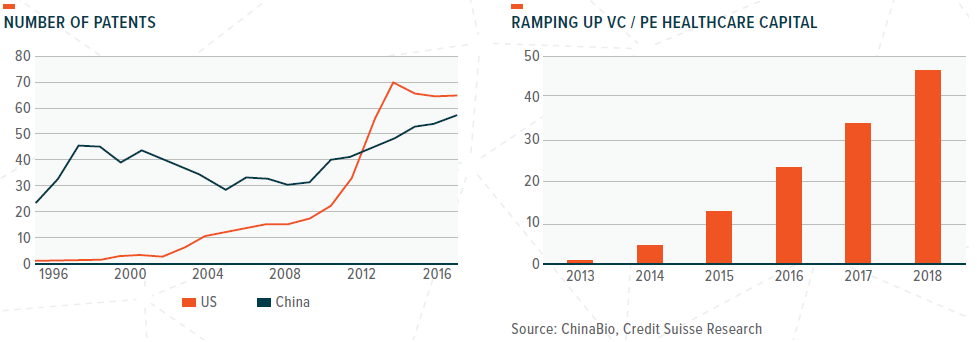The Next Giant in Biotech
Biotechnology is the science and business of using biological materials, such as proteins, antibodies, genes, and cells, to develop new drugs and treatments.
Humans have been harnessing the power of organisms for thousands of years – bread-making is an early example – but recent advances in genome sequencing and bioinformatics have revolutionized our understanding of biosciences. They may present the first legitimate possibility of treating illnesses once thought of as incurable or fatal.
Genetic mutation is an example of biotechnology. The World Health Organization estimates that mutations in a single gene are responsible for over 10,000 different human diseases1; this is likely to be the first time it can be treated through genomics.
China’s Biotech Boom
In China, the healthcare market remains highly underpenetrated in comparison with global peers. However, with an aging population, rising affluence, and the incidence of non-communicable diseases like cancer and diabetes well above the world average, it is on the cusp of enormous growth.
Grand View Research forecasts that the global genomics market will be worth about USD22 billion by 2020, with a growth rate of 10% a year. In China, biotech accounts for only 12% of the country’s total drug market, compared with the global average of 25%. Yet the country already has the second-largest genomics market (and second-largest pharmaceuticals market) in the world. It is set to overtake the US to become the most significant player in the next few years.
Frost & Sullivan estimates that China will have the world’s fastest-growing biotech industry by 2021, with an annual expansion rate of 16.4% over the next five years. In 2017, the total value of domestic and international Chinese biotech initial public offerings reached a record of USD2.8 billion. Venture capital and private equity investment in Healthcare had also been ramping up quickly. Healthcare capital investment grew at a CAGR of 132% between 2013 and 2017, while domestic venture capital investment reached a record of USD17.4 billion in the biotech sector in 2018.
Be Local, Go Global
In the longer-term, China’s biotech business has the potential to go global, either by out-licensing molecules to overseas markets or by developing assets in the US, EU, and elsewhere. In 2018, Chinese biotech companies made 164 cross-border licensing deals, more than double the 2013 figure, according to China Bio2. China is currently pursuing trials for one-quarter of its innovative assets overseas.
The country’s increasing dominance is reflected in the number of biotechnology patents granted, rising from 1,000+ to more than 6,000 in 2006 – 2016, with a percentage increment from 12% to 27%. In 2012, China even surpassed the US in this area.
China’s government has listed biotechnology as one of the ten critical sectors for development under its “Made in China 2025” industrial strategy. To support the development of the industry, the government is improving the country’s regulatory framework, reforming the drug-approval process, and providing precise guidance for biosimilar developers.
There are risks, of course. The sector requires substantial investment in R&D, and those investments are not guaranteed to lead to commercially successful products. A promising company’s prospects are also vulnerable to changes in the regulatory environment, intensifying competition, and the rapidly evolving nature of technological progress.
Intellectual property remains a concern, too. Many biotech companies are dependent on the ability to use and enforce intellectual property rights and patents. Even if enforcement is effective, the expiry of rights and patents can have an adverse financial consequence for those companies.
Investors can gain exposure to early-stage biotech innovation in the sector via private equity, new IPOs, recently listed Chinese biotech companies on domestic and overseas stock exchanges, and through legacy Chinese pharmaceutical companies moving into biologics.


